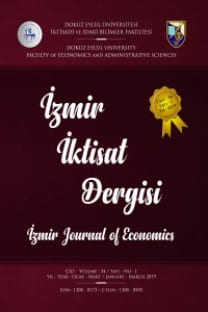GÖNÜLLÜ İŞTEN AYRILMALAR ÜZERİNE EKONOMETRİK BİR YAKLAŞIM
Gönüllü işten ayrılma, lojistik regresyon analizi, Pearson korelasyon analizi, güvenirlik analizi
AN ECONOMETRIC APPROACH ABOUT VOLUNTARY TURNOVER
Voluntary turnover, logistic regression analysis, Pearson correlation analysis, reliability analysis,
___
- Antel, J., James R.H. ve Chrısten E.P.(1987), “Military Enlistment and Attrition: An Analysis of Decision Reversal”, FMP, 3510.
- ARDIÇ, Kadir ve DÖVEN, Musa S.(2004), “Türkiye‟de İnsan Kaynakları Uygulamalarının Değerlendirilmesi (Amasya İli Çevresinde Bir Uygulama)”, Yönetim Bilimleri Dergisi, cilt 2, sayı 2, .69-83.
- Baroudi, J. J. (1985), “The Impact of Role Variables on IS Personnel Work Attitudes and Intentions”, MIS Quarterly, cilt 9, sayı 4, .341-356.
- Buddın, R.(1998), “Trends in Attrition of High-Quality Military Recruits”, FMP, 3539.
- Clark R. P. ve Harcourt M.(2000), “The Determinants of Employee Turnover Behaviour: New Evidence from a New Zealand Bank”, Research and Practice in Human Resource Management, cilt 8, sayı 2, 61-71.
- Cooke, T. W. ve Quester, A. O.(1992), “What Characterizes Successful Enlistees in the All-Volunteer Force: A Study of Male recruits in the U.S. Navy”, Social Science Quarterly, .238-252.
- Dalessio,A., Silverman, W. ve Shuck J.(1986), "Paths to Turnover: A Re- Analysis and Review of Existing Data on The Mobley, Horner and Hollingsworth‟s Turnover Model”, Human Relations, sayı 30, 245-264.
- Eren, Erol (2004), Örgütsel Davranış ve Yönetim Psikolojisi, İstanbul.
- Hom, P. W. ve Griffeth, R. W.(1995), Employee turnover, Cincinnati, OH: South Western.
- Igbaria, M., ve Siegel, S. R.(1992), “The Reasons for Turnover of Information Systems Personel”, Information and Management, cilt 23, sayı 6, 321-330.
- Jacoby&Mathew, Sanford M. ve Finkin, W.(2004), “Labor Mobility in a Federal System: The United States”, International Journal of Comparative Labour Law and Industrial Relations, cilt 20, sayı 3.
- Johnsrud, Linda K. ve Rosser, Vicki J.(2002), “Faculty Member‟s Morale and Their Intention to Leave,” The Journal of Higher Education, cilt 73, sayı 4, Columbus, Ohio, s.285 - 309.
- Jovanovic, B.(1979b), “Firm-Specific Capital and Turnover”, Journal of Political Economy, cilt 87, sayı 6, 1246 - 1260.
- Mathis, R. ve Jackson J.(2000), Human Resource Management, South- Western College Publishing, Cincinnati, Ohio.
- Mobley, H. ve başk.(1979), “Rewiev and Conceptual Analysis of the Employee Turnover”, Psychology Bulletin, sayı 86, 493-522.
- Porter, L. ve Steers, R.(1975), Motivation and Work Behavior, New York, Mc Graw Hill.
- “Çalışanların üçte biri, iki yıl içinde işlerinden ayrılıyor “, (Nisan 2004), http://www.haygroup.com.tr
- ISSN: 1308-8173
- Yayın Aralığı: Yılda 4 Sayı
- Başlangıç: 1986
- Yayıncı: Dokuz Eylül Üniversitesi İktisadi ve İdari Bilimler Fakültesi
KOLLEKTİF RİSK MODELLEMESİNDE PANJÉR YÖNTEMİ
PERVİN BAYLAN İRVEN, GÜÇKAN YAPAR
TÜRKİYE’DE BÖLGESEL KALKINMA AJANSLARI VE BU AJANSLARA YÖNELİK ELEŞTİRİLER
BİLEŞİK ÖNCÜ GÖSTERGE VE SEKTÖREL ENDEKSLER ARASINDAKİ İLİŞKİ
ERK HACIHASANOĞLU, UĞUR SOYTAŞ
RİDGE REGRESYONDA M TAHMİN EDİCİLERİNİN KULLANIMI ÜZERİNE BİR UYGULAMA
HATİCE ŞAMKAR, ÖZLEM ALPU, EKREM ALTAN
GÖNÜLLÜ İŞTEN AYRILMALAR ÜZERİNE EKONOMETRİK BİR YAKLAŞIM
ADALET EREN, BEDRİYE SARAÇOĞLU
AHMET ÖZTÜRK, ŞENOL ERDOĞMUŞ, VESİLE SİNEM ARIKAN
GENÇLERİN TOPLUMSAL YAŞAMA KATILIMI VE YEREL YÖNETİMLERİN ROLÜ
ÖRGÜT KÜLTÜRÜNÜN ÖRGÜTSEL BAĞLILIK ÜZERİNE ETKİSİ VE BİR UYGULAMA
BALONLARI DAHA İYİ TANIMAYA ÇALIŞMAK: BALON TANIMLARI, MODELLERİ VE LALE ÇILGINLIĞI ÖRNEĞİ
HİSSE SENEDİ FİYATLARI İLE MAKROEKONOMİK DEĞİŞKENLERİN ETKİLEŞİMİ
